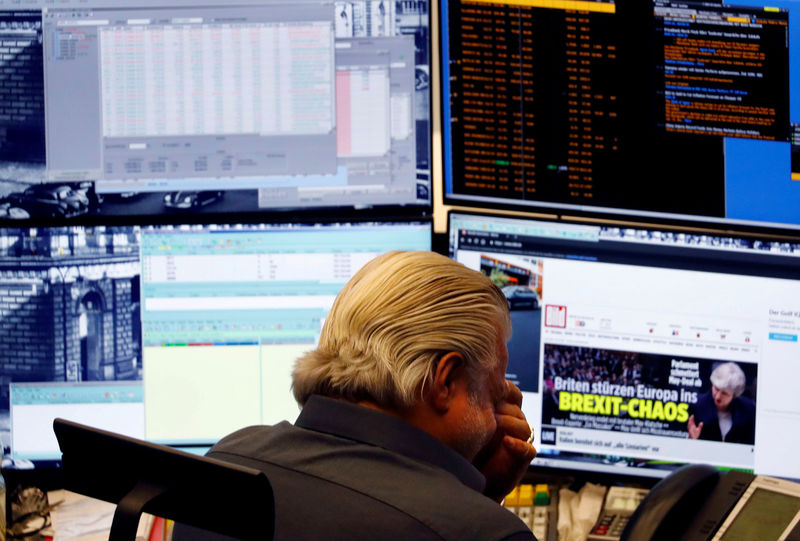By John O'Donnell and Tom Sims
FRANKFURT (Reuters) - Germany could use emergency measures to counter any market panic from a hard Brexit, an official with direct knowledge of the matter said, such as banning bets on falling share prices, a step last used in the financial crisis.
Germany, whose Frankfurt stock market is one of Europe's largest, is the most significant of a group of countries to consider such a temporary ban on short-selling of shares, including Italy and the Netherlands.
Although no emergency measures have yet been triggered, the preparations underscore the continent's heightened state of alert, with negotiations to secure Britain's orderly departure from the European Union hanging in the balance.
In the event of a slide in markets, authorities in Frankfurt, Amsterdam and Rome could curb the form of trading known as short-selling, officials in those countries told Reuters, in order to stem any exaggeration of price swings.
British Prime Minister Boris Johnson has pledged to take the United Kingdom out of the bloc on Oct. 31 whether or not a withdrawal agreement has been reached. He has not explained how he can get around a law passed by parliament saying Britain cannot leave without a deal.
Many bankers, however, fear that failure to clinch agreement this week could rattle markets far sooner.
Germany's markets regulator BaFin would probably identify a basket of companies particularly vulnerable to the economic fallout of Brexit for a temporary short-selling ban, a second person with knowledge of the matter said.
Germany has done so before. During the financial crash last decade, BaFin singled out a number of banks and other companies to stop short-selling in those stocks.
Earlier this year, the watchdog enacted its first-ever ban on short sales of a single stock, Wirecard (DE:WDIG). It lasted two months and was aimed at curbing volatility.
While investors can also short-sell corporate bonds, BaFin is chiefly looking at companies' shares, the second person said.
SHORT NOTICE
The Dutch Authority for the Financial Markets (AFM) is making similar preparations. A spokesman said trading venues could briefly suspend trading in instruments such as shares if there was a spike in price swings.
"The AFM will exercise restraint in applying any tools that directly interfere in trading such as temporary short-sell bans," he said. "The financial markets have become much more robust since the financial crisis of a decade ago."
Rome could take similar measures. An Italian official, speaking on condition of anonymity, said its financial market regulator, CONSOB, could impose a short-selling ban if "extreme volatility" around Brexit were to endanger financial stability.
A decision to enact a ban would be taken at short notice, depending on market developments, the person said.
In short-selling, traders borrow a company stock with a view to selling it, hoping to then scoop up the shares at a lower price later and pocket the difference.
When the number of short-sellers outweighs those interested in buying the stock, which could happen if investors rush to sell after a Brexit shock, that can further drive down the price of shares.
Under EU law, national authorities have the power to introduce such bans. They are required to inform the EU umbrella body, the European Securities and Markets Authority, an ESMA spokesman said.
Banks and traders are on tenterhooks as efforts between London and Brussels to seal a framework deal for when Britain leaves the bloc look as uncertain as ever.
The main sticking point is customs and security arrangements for the border between EU member Ireland and the British province of Northern Ireland, which will become the only land frontier between the EU and the United Kingdom.
Beyond the technical preparations for Brexit, such as ensuring that cross-border trading deals do not suddenly become invalid, little is known about how central banks and regulators would respond to a sudden market dip.
Many authorities, including France, have declined to outline their preparations. A spokesman for Britain's FCA regulator said it had "tools to respond in the event of market disruption and stand ready to act if necessary".
While banning short-selling can soften the impact of a shock, market experts say this only works for a limited time.

"The market is always right," said David Buik, a financial analyst at trader Core Spreads. "If you ever interfere because you don't like what's happening, you don't have a proper market."